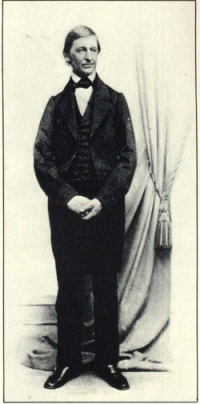Walt Whitman and Ralph Waldo Emerson
I think Walt Whitman went to the help wanted section and found a squib that said "Wanted: National Poet." And he was innocent enough to believe there really was such a job. And if he could just write a poem that incorporated everything he felt and suspected and hoped for from America that he would have the position.
Allan Gurganus
Rocky Mount, North Carolina
Whitman had a remarkable faith in ordinary people to understand his book. It's celebrating American democracy. It's talking the language of the people. It's attacking aristocratic influences in American life. Why wouldn't this be very, very popular with the people? He expected stage drivers to stop between runs and pull out a copy of Leaves of Grass. People going out to plow the fields have a copy of Leaves of Grass...
Kenneth Price
Lincoln, Nebraska
Biography:
http://www.biography.com/people/walt-whitman-9530126
http://www.pbs.org/wgbh/amex/whitman/timeline/
http://www.whitmanarchive.org/
classroomelectric.org/cgi-bin/fipsesearch.pl
This section of the site includes two letters, one by Emerson and one by Whitman that became a part of the second edition of Leaves of Grass. This exchange began as a private note of encouragement from Emerson, a well-known poet and lecturer, to an obscure journalist at the beginning of his poetic career.
The following letter to Whitman from Ralph Waldo Emerson, 21 July 1855 is among the most famous letters ever written to an aspiring writer. Here Emerson suggests the complex foreground that preceded the publication of Leaves of Grass. Without asking Emerson's permission, Whitman gave this private letter to Charles Dana for publication in the New York Tribune on October, 1855.
 |
DEAR
SIR--I am not blind to the worth of the wonderful gift of
"LEAVES OF GRASS." I find it the most extraordinary
piece of wit and wisdom that America has yet contributed.
I am very happy in reading it, as great power makes us happy.
It meets the demand I am always making of what seemed the
sterile and stingy nature, as if too much handiwork, or too
much lymph in the temperament, were making our western wits
fat and mean.
I give you joy of your free and brave thought. I have great joy in it. I find incomparable things said incomparably well, as they must be. I find the courage of treatment which so delights us, and which large perception only can inspire. I greet you at the beginning of a great career, which yet must have had a long foreground somewhere, for such a start. I rubbed my eyes a little, to see if this sunbeam were no illusion; but the solid sense of the book is a sober certainty. It has the best merits, namely, of fortifying and encouraging. I did not know until I last night saw the book advertised in newspaper that I could trust the name as real and available for a post-office. I wish to see my benefactor, and have felt much like striking my tasks, and visiting New York to pay you my respects. R.W. EMERSON
Concord,
Massachusetts, 21 July, 1855
|
No comments:
Post a Comment